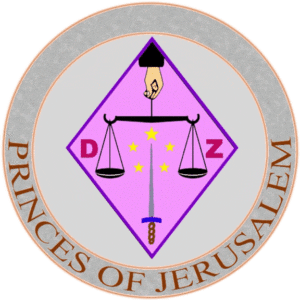The Historical Degrees ( 15° – 16° )
The two historical degrees conferred in a Council Princes of Jerusalem cover the period from 538 to B.C. 516 they deal persons and events connected with the end the Babylonian Captivity of Israel, the return of some of the captives of Jerusalem, and the rebuilding of the temple.
The 15th degree, Knight of the East and the 16th degree, Prince of Jerusalem are often referred to as historical degrees in Scottish Rite Freemasonry and constitute an allegorical narrative presenting the story of a captive people who “wept beside the rivers of Babylon” when liberated they were consecrated to the task of building the second Temple or rather rebuilding the Temple of Solomon. The entire pageantry and symbolism of Freemasonry revolves around the construction of the four Temples of Yahweh, by a brotherhood dedicated to the erection of a perfect edifice at Jerusalem and later building a Temple in the hearts of men. Contrasted the hauteur of imperious monarchs, is the humility of the little group of those born to bondage pleading for the redress of an ancient wrong. The lessons in the 15th and 16th degrees are from these elements of the historical drama which transpired during the reigns of the Great Kings, Cyrus and Darius

Portland Council Princes of Jerusalem
Officers 2021-2022
Paul F. Poulin – Sovereign Prince
Jeremiah J. King – High Priest
Derrick J. Gittleman – Senior Warden
David K. Horne – Junior Warden
Casey W. Graffam – Master of Ceremonies
Edward "Tim" Beals – Master of Entrances
A Council of Princes of Jerusalem has the responsibility to confer the 15°-16° which are referred to as “historical degrees.” These degrees explore the conflicts and politics in the rebuilding of the Temple of Solomon.
15th Degree - Knight of the East
This degree teaches us to emulate Zerubbabel who, even when tempted, would not violate his obligations. Philosophy: Loyalty to conviction, fidelity to duty, and devotion to truth are the essences of integrity. Core Values: Integrity.
16th Degree - Prince of Jerusalem
The court of King Darius contemplates what motivates man. Philosophy: We learn that devotion to truth surpasses secular motivations. Core Values: Reverence for God.
